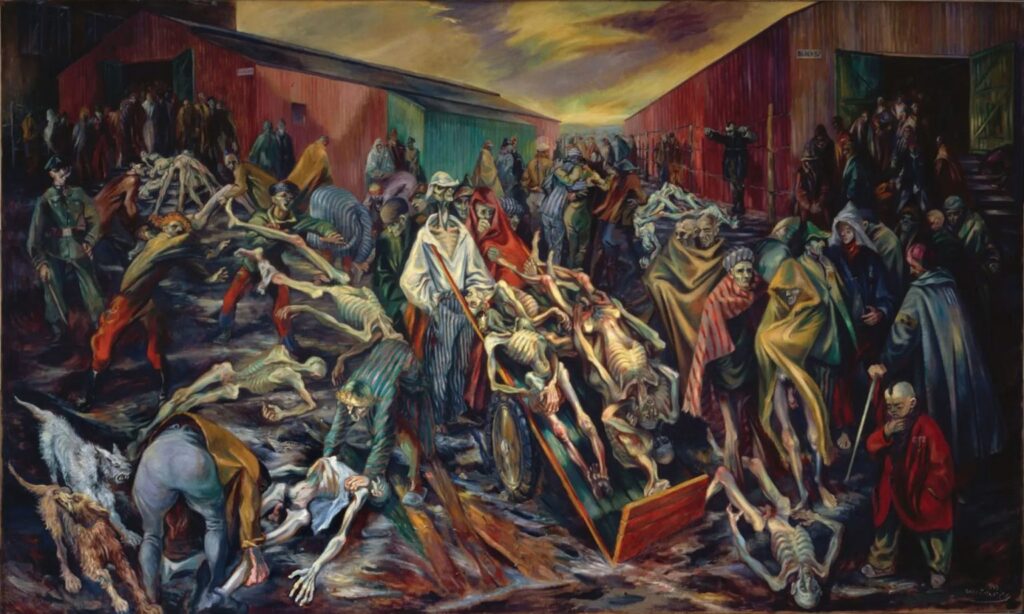Instead of solving the problems of the majority, the ‘far right of a special type’ – a right that is intimately tied to liberalism – cultivates a politics of anger.
14 Nov 2024 – When Dante Alighieri and his guide reach the fifth circle of hell in Inferno’s Canto VII, they come across the River Styx, where people who could not contain their anger in life now wallow and fight each other on the surface of the turbulent, muddy water, and below them lie those who had been sullen in life, their frustrations coming to the surface as bubbles:
And I, who stood intent upon beholding,
Saw people mud-besprent in that lagoon.
All of them naked and with angry look.They smote each other not alone with hands,
But with the head and with the breast and feet,
Tearing each other piecemeal with their teeth.
Every culture depicts some variation of this characterisation of hell, in which those who have violated rules that are intended to produce a harmonious society suffer an afterlife of punishment. For instance, in the Indian Gangetic plain, centuries before Dante, the unknown authors of the Garuda Purana described the twenty-eight different narakas (hells). The similarities between Dante’s Inferno and the Garuda Purana can be explained by the common horrors and fears that human beings share: being devoured alive, drowned, and mutilated. It is as if the justice available to most people on Earth is insufficient, and so there is hope that a divine justice will eventually deliver a deferred punishment.
Wayan Ketig (Indonesia), Bima Swarga, c. 1970
In January 2025, Donald Trump – who has cultivated a politics of anger that is not uncommon in our world – will be inaugurated for his second term as the president of the United States. Such a politics of anger is present in many countries, including across Europe – which otherwise sees itself as somehow above the brutal emotions and as a continent of reason. There is a temptation amongst liberals to characterise this politics of anger as fascism, but this is not accurate. Trump and his political confraternity across the world (from Giorgia Meloni in Italy to Javier Milei in Argentina) do not advertise themselves as fascists, nor do they wear the same emblems or use the same rhetoric. Though some of their followers brandish swastikas and other fascist symbols, most of them are more careful. They do not wear military uniforms, nor do they call the military out of the barracks to lend them a hand. Their politics is couched in a modern rhetoric of development and trade alongside the promise of jobs and social welfare for nationals. They point their fingers at the neoliberal pact of the old parties of liberalism and conservatism and mock them for their elitism. They elevate individuals from outside the ranks of the elites as saviours, men and women who they say will finally speak for the discarded precarious workers and the declined middle classes. They speak angrily to differentiate themselves from the old parties of liberalism and conservatism, who speak without emotion about the ghastly social and economic landscape that now exists in much of the world.
This begs the question: are the leaders of this ‘far right of a special type’ – a new kind of right wing that is intimately tied to liberalism – doing anything especially unique? A close look shows that they are merely building upon the foundation laid by the colourless leadership of the old parties of liberalism and conservativism. For example, the old parties already:
- decimated the social fabric through privatisation and deregulation, weakened trade unions through policies of uberisation, and created insecurity and atomisation in society.
- enforced policies that have increased inflation and deflated wages while increasing the wealth of the few through lax tax policies and rising stock markets.
- strengthened the repressive apparatus of the state and tried to stifle dissent, including by targeting those who want to rebuild working-class movements.
- encouraged war and devastation, such as by preventing a peace deal in Ukraine and encouraging the US-Israeli genocide of Palestinians.
Such a politics of anger is already in motion in society, though none of it was created by the far right of a special type. A world of anger is the product of the neoliberal pact of the old parties of liberalism and conservatism. It is neither the Alternative for Germany (Alternative für Deutschland, AfD), nor France’s National Rally (Rassemblement national) or Trump in his first term that have produced this world, however repellent their politics may be. When these groups win state power, they become beneficiaries of a society of anger produced by the neoliberal pact.
Toyohara Kunichika (Japan), Yanagikaze Fukiya no Itosuji, 1864
The language of Trump and his political family is nonetheless alarming. They speak with casual anger, and they turn that anger against the vulnerable (especially migrants and dissidents). Trump, for example, speaks of refugees as if they are vermin that need to be exterminated. Older, decadent language can be heard in the rhetoric of the far right of a special type, the language of death and disorder. But this is their tone, not their policies. The old parties of the neoliberal pact have already sent their militaries to the border, invaded the slums, cut social relief and welfare out of the budgets of their countries, and increased spending for repression at home and abroad. The old politicians of the neoliberal pact will say that the ‘economy’ is flourishing, by which they mean that the stock market is bathed in champagne; they say that they will protect the right of women to control their health but pass no legislation to do so; they say that they are for ceasefires while they authorise weapons transfers to continue war and genocide. The neoliberal pact has already dislocated society. The parties of the far right simply push away the hypocrisy. They are not the antithesis of the neoliberal pact but its more accurate mirror image.
Yet irrational anger is not the mood of the people who vote for the parties of the far right of a special type, a cliché woven by unimaginative neoliberal politicians. It is the tone of the far right of a special type’s leading politicians that would earn them a place in the fifth circle of Dante’s hell. They are the angry ones. Their elite opponents, the politicians of the old parties of liberalism and conservatism, are the sullen ones, under the mud, their emotions muffled.
Franz von Stuck (Germany), Inferno, 1908
In 2017, Brazil’s Perseu Abramo Foundation published a study about the political perceptions and values of the residents of São Paulo’s favelas, which found that they are in favour of more social policies of relief and welfare. They know that their hard work does not result in sufficient means, and so they hope that government policies will provide additional support. These opinions should theoretically lead to the growth of class politics. Yet the researchers found that this was not the case: instead, neoliberal ideas had flooded the favelas, leading its residents to see the primary conflict not as one between the rich and the poor, but one between the state and individuals, setting aside the role of capital. The findings of this study are replicated in many other similar investigations. It is not that the sections of the working class that turn to the far right of a special type are irrationally angry or deluded. They are clear about their experience, but they blame the degradation of their lives on the state. Can you blame them? Their relationship to the state is not shaped by social workers or welfare offices, but by the viciousness of the special police that are authorised to deny their civil and human rights. And so, they come to associate the state with the neoliberal pact and to hate it. Rising from these muddy waters, the politicians of the far right appear as potential saviours. Never mind that they have no agenda to reverse the carnage that the neoliberal policies of the old parties inflict on society: at least they purport to hate it, too.
Fuyuko Matsui (Japan), Keeping up the Pureness, 2004
Yet the agenda of the far right of a special type is not to solve the problems of the majority: it is to deepen them by inflicting an acerbic form of nationalism on society, one that is not rooted in love of one’s fellow human beings but in hatred of the vulnerable. This hatred then masquerades as patriotism; the size of the national flag grows, and enthusiasm for the national anthem increases by decibels. Patriotism begins to smell of anger and bitterness, of violence and frustration, of the mud of hell. It is one thing to be patriotic about flags and anthems, but it is another to be patriotic against starvation and hopelessness.
Human beings ache to be decent, but that ache has been smothered in the mud by desperation and resentment. Dante and his guide eventually make their way through the circles of hell, crossing streams and chasms to arrive at a small hole in the firmament from which they can see the stars and have their first glimpse of paradise. We ache to see the stars.
_______________________________________________
 Vijay Prashad is an Indian historian, editor and journalist. He is a writing fellow and chief correspondent at Globetrotter. He is the director of Tricontinental: Institute for Social Research and a senior non-resident fellow at Chongyang Institute for Financial Studies, Renmin University of China. He has written more than 20 books, including The Darker Nations and The Poorer Nations. His latest book is Washington Bullets, with an introduction by Evo Morales Ayma.
Vijay Prashad is an Indian historian, editor and journalist. He is a writing fellow and chief correspondent at Globetrotter. He is the director of Tricontinental: Institute for Social Research and a senior non-resident fellow at Chongyang Institute for Financial Studies, Renmin University of China. He has written more than 20 books, including The Darker Nations and The Poorer Nations. His latest book is Washington Bullets, with an introduction by Evo Morales Ayma.
